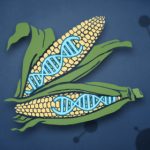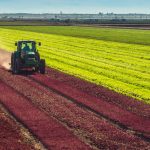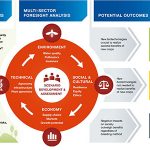
Jennifer Kuzma in the WSJ: Referring to gene-editing as “breeding” seems disingenuous
Is This Tomato Engineered? Inside the Coming Battle Over Gene-Edited Food The agriculture industry, which hopes Crispr technology will transform the business, faces opponents who call it ‘GMO 2.0’ By Jacob Bunge and Amy Dockser...
Space for the Social Sciences in Engineering Biology
I had the pleasure of attending the Canada SynBio 2018 Conference “Engineering Biology for Health, Food and the EnvIronment in Toronto last week. While I’ve been to many such events in the United States, this...Continue reading "Space for the Social Sciences in Engineering Biology"

Journal of Responsible Innovation publishes ‘Roadmap to Gene Drives’ special issue
The Genetic Engineering and Society Center at NC State hosted a workshop in February of 2016, supported in part by the National Science Foundation, entitled ‘A Roadmap to Gene Drives: A Deliberative Workshop to Develop...
Jennifer Kuzma on Institute for Emerging Issues First in Future podcast
December 12, 2017 Dr. Jennifer Kuzma speaks with Leslie Boney, Director of the Institute for Emerging Issues (IEI) at NC State on the First in Future podcast. In this pod, Dr. Kuzma discusses gene edited...Continue reading "Jennifer Kuzma on Institute for Emerging Issues First in Future podcast"

Gene Drives and Responsible Innovation
It is not often that a new technology is at once hailed as a potential solution to pandemic disease, wildlife conservation and hunger, while also being feared as a potential military and environmental “bioweapon.” Gene drives,...
Politics “Trumps” Science in the Regulation of Genetically Engineered Crops
In recent years, the regulatory system for biotechnology products has not kept pace with newer ways of engineering organisms, such as through the use of gene editing like CRISPR-Cas9 systems. Under the Obama administration, progress had been made in clarifying U.S. biotechnology regulations. In January 2017, in the last few days of Obama’s term, several proposals were made for updating agency regulations and guidance documents. In particular, new US USDA regulations were proposed for GE crops. Fast forward ten months, and the Trump administration has pulled this proposed rule back to “start fresh” and reconsider the issue. This is no surprise, as it is not uncommon for new political administrations to recall regulatory policy for biotech. Many industry and academic scientists developing GE crops are pleased to hear about the Trump administration’s recall of USDA proposed regulations....Continue reading "Politics “Trumps” Science in the Regulation of Genetically Engineered Crops"

Genetic Literacy Project: USDA scraps overhaul of GMO and gene edited crop regulations that biotech advocates viewed as ‘unscientific’
“I think the real reason [for the withdrawal] is that the new proposed rule would have brought more gene-edited crops under its authority,” stated Kuzma. “And this new administration isn’t too fond of regulations in general.”...
Scientific American: Could Genetic Engineering Save the Galápagos?
Campbell first became intrigued by the possibilities of gene drive in 2011, when he sat in on a conference call between biologists at NC State University and officials of the U.S. Fish and Wildlife Service to discuss a possible genetic approach to control a runaway mouse problem on Southeast Farallon Island, about 20 miles west of the California coast, near San Francisco. John Godwin, a North Carolina State neurobiologist who studies animal behavior, had learned of the Farallon issue while skimming the Internet in 2011. He happened to be at a university with an established infrastructure dedicated to experimenting with—and considering the ethical implications of—genetic manipulation....Continue reading "Scientific American: Could Genetic Engineering Save the Galápagos?"

Science: Trump’s agriculture department reverses course on biotech rules
It’s a predictable move by President Donald Trump’s White House to take another look at the policies of the previous administration, says Jennifer Kuzma, a social scientist who co-directs the Genetic Engineering and Society Center at North Carolina State University in Raleigh. “I expected them to eventually catch wind that this was something that USDA was doing, and reverse it.”...Continue reading "Science: Trump’s agriculture department reverses course on biotech rules"

Scientific American article on public acceptance of CRISPR features Delborne and Kuzma
“Without transparency, we might see a kind of hyperpolarization,” says Jason Delborne, a professor of science, policy and society at North Carolina State University. Concerned groups will feel marginalized, and advocates won't receive critical feedback needed to improve design and safety. “This puts the technology at risk of a knee-jerk moratorium at the first sign of difficulty,” he notes....
Kuzma examines benefits, regulation of gene edited crops in EMBO
In this article, published by EMBOpress, researchers look at how new genetic-engineering (GE) technologies based on gene editing can help to generate crop varieties to address critical challenges in agricultural development. However, governance systems for these crops are poorly defined and currently uncertain....Continue reading "Kuzma examines benefits, regulation of gene edited crops in EMBO"

Jennifer Kuzma quoted in Slate on biotech regulatory issues
Biotechnology is moving at lightening speed, especially with the advances in genetic engineering and synthetic biology. However, policies and regulations lag far behind, leaving potentially dangerous gaps in classification and oversight. Dr. Jennifer Kuzma, GES...Continue reading "Jennifer Kuzma quoted in Slate on biotech regulatory issues"

Jennifer Kuzma publishes Trails and Trials in Biotechnology Policy
Reflecting on her journey from undergrad at a small liberal arts college to scientist, professor and world-renowned expert on governance for emerging biotechnologies, Jennifer Kuzma has published a chapter in Women in Sustainable Agriculture and...Continue reading "Jennifer Kuzma publishes Trails and Trials in Biotechnology Policy"